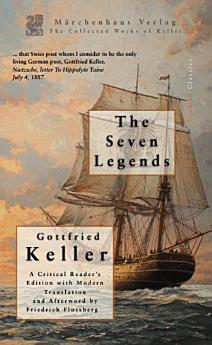Seven Legends
May 2024 · Marchen Press
Ebook
135
Pages
family_home
Eligible
info
reportRatings and reviews aren’t verified Learn More
About this ebook
A modern translation of "The Seven Legends" (sieben Legenden) by Gottfried Keller. The Seven Legends is a novella cycle initially published in 1872 but conceived during the author's time in Berlin. This slim work established Keller's reputation in Germany, although it sparked controversy. The stories explore various themes through allegorical tales set in the early Christian era. These stories delve into the lives and virtues of characters who often defy societal norms, illustrating moral and spiritual lessons through their extraordinary experiences. The Legends' centerpiece is the Virgin Mary, depicted in an interpretation and form divergent from both Catholic and Protestant perspectives. She assumes the role of the "magna mater of earthly and affectionate love," embodying a syncretic deity merging elements of Paganism and Christianity into a feminine trinity of love or a post-Christian Mother Earth. While Theodor Fontane found it repugnant for deviating from the natural simplicity of the legend form, Eduard Mörike was captivated by it. In this collection of allegorical tales, Keller delves into the realms of myth and spirituality. One prominent legend features Eugenia, an educated and beautiful Roman girl who, in order to escape social constraints, disguises herself as a man and enters a convent. Her intellectual pursuits and interactions with the young proconsul Aquilinus highlight themes of gender roles, education, and the quest for personal freedom. Eugenia's journey ultimately leads to a spiritual transformation that emphasizes the value of inner virtue over outward appearances. Another story concerns Count Gebizo and his virtuous wife, Bertrade. Once wealthy and charitable, Gebizo's excessive generosity plunges him into poverty. In a desperate attempt to regain his fortune, he encounters a sinister stranger who offers him wealth in exchange for his wife. This story underscores the themes of faith, temptation, and redemption as Bertrade's unwavering virtue ultimately triumphs over the devil's deception, demonstrating the power of righteousness and divine intervention. The final legend tells the story of Beatrix, a nun who, driven by worldly desires, leaves her convent only to be seduced by a knight. Her subsequent return to the convent and miraculous experiences underscore themes of repentance, divine grace, and the enduring power of faith. Beatrix's transformation from a restless soul to a devoted servant of God illustrates the possibility of redemption and the profound effects of spiritual commitment. This modern critical reader's translation from the original German includes supplementary materials that bring Keller's life and impact to life. Nietzsche considered Keller to be one of the greatest living poets of his time. However, his works are rarely found in other languages, so most people today are unaware of who he was or why he was important. This edition remedies that situation by providing a clear, accessible version of Keller's original German writing and offering insight into his broader ideas and the philosophical landscape in which he operated. Working directly from Keller's manuscripts, this new translation delivers literary excellence and scholarly depth with amplifying materials. Readers will discover not only Keller's powerful voice but also the philosophical currents that shaped an entire era of German thought. The edition includes an illuminating afterword tracing Keller's intellectual relationship with Nietzsche, revealing the fascinating dialogue between two of the period's most influential minds. A comprehensive timeline connects the major events of Keller's life with his published works, and a detailed index provides an authoritative guide to his complete writings. Together, these materials provide newcomers and serious readers with everything needed to appreciate one of literature's most overlooked figures.
About the author
One of Nietzsche's favorite living poets (the only real Swiss poet in his opinion, Keller was a major Swiss poet and writer, Keller is best known for his novel "Green Henry" (German: "Der grüne Heinrich"). His work is representative of the Realist movement, which sought to depict life and society as they were. Keller's stories often reflect the conflict between individual creative drives and the constraints of society. His novel "The People of Seldwyla" was one of Nietzsche's favorite.
Rate this ebook
Tell us what you think.
Reading information
Smartphones and tablets
Install the Google Play Books app for Android and iPad/iPhone. It syncs automatically with your account and allows you to read online or offline wherever you are.
Laptops and computers
You can listen to audiobooks purchased on Google Play using your computer's web browser.
eReaders and other devices
To read on e-ink devices like Kobo eReaders, you'll need to download a file and transfer it to your device. Follow the detailed Help Center instructions to transfer the files to supported eReaders.







